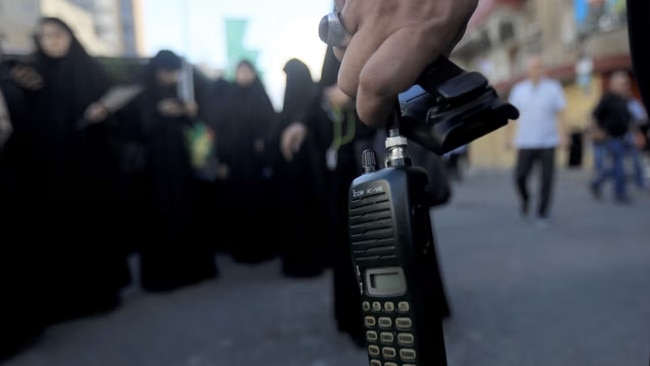Israel scored a stunning blow against Hezbollah. Its path to victory is less clear
Whether the one-two punch against Hezbollah results in a decisive victory remains in question. If anything, it might have brought the two sides closer to a full-scale conflict, as Israel braces for a response.

In a long history of audacious operations, exploding pagers and walkie-talkies across Lebanon was one of Israel’s boldest feats, delivering a stunning tactical success that threw the militant group Hezbollah into disarray and which could help restore the deterrence Israel lost on Oct. 7.
What remains in question is whether it did anything to solve Israel’s pressing problems: stopping Hezbollah’s rocket-and-missile attacks and returning tens of thousands of Israelis to the northern border region. If anything, it might have brought the two sides closer to a full-scale conflict, as Israel now braces for Hezbollah’s response.
The Biden administration, which is still struggling to find a diplomatic solution to avert a major war between Israel and Hezbollah, says it wasn’t consulted on the attack.
The attack achieved a number of Israel’s tactical aims, former military officials and analysts said. It disrupted Hezbollah’s operations, injuring thousands of its members and showing a deep penetration of the militant group’s supply chain and communications network. Explosives injected into the batteries of thousands of pagers by Israel, according to people briefed on the operation, detonated simultaneously this week.

It is also one of a string of attacks, including the recent killings of Hezbollah and Hamas leaders, that have helped re-establish the fearsome reputation of Israel’s military and intelligence services after the Oct. 7 attack.
“This sends a message to Hezbollah that this is going to look ugly for you,” said Amos Yadlin, a former head of military intelligence. “We aren’t going only to play with you on the northern border. It will be all over the place with some operations that we never did before.” The question now is if the attack will have a lasting effect. Hezbollah has said it won’t stop fighting Israel along the border until the war in Gaza ends. The US has been pursuing a broad diplomatic solution that would include an initial ceasefire in Gaza in exchange for the release of Israeli hostages and perhaps ultimately end the fighting with Hezbollah, but those efforts haven’t so far achieved a breakthrough.
In a conversation on Wednesday, Defense Secretary Lloyd Austin told his Israeli counterpart Yoav Gallant that the US was still pushing to achieve a Gaza ceasefire deal, and an “enduring diplomatic resolution to the conflict on the Israeli-Lebanon border that will allow civilians on both sides to return to their homes.” Tens of thousands of Lebanese have also been displaced by the conflict.
Israeli officials have been saying for weeks that the time for a diplomatic solution was quickly running out, suggesting a military operation to push Hezbollah away from its border and deter its rocket attacks was the most likely outcome.
When the pager attack unfolded, some suspected it marked the prelude to a full-scale Israeli assault on the northern border. As walkie-talkies exploded the next day, and Israel began to move some troops to the north, suspicions hardened that it might be a precursor to a larger operation.
But with no further Israeli military actions since, some analysts have questioned whether Israel’s tactical victory will yield an enduring success.

“All of this is based on excellent intelligence,” said Eyal Pinko, a former Israeli intelligence official.
“In the short term this is an extraordinary tactical achievement. In the long term, it doesn’t produce any military and political achievement.”
Israel has a long and storied history of daring raids and far-flung covert operations that carry high risks but can yield big rewards.
This week’s operations follow other audacious operations by Israel in recent months. It killed top Hamas military leader Saleh al-Arouri in Beirut in January. Last month, a precise Israeli strike in Beirut killed Fuad Shukr, Hezbollah’s second in command and a terrorist who had eluded US capture for four decades after masterminding a bombing that killed 241 servicemen in Lebanon in 1983.
Shortly after that strike, Hamas political leader Ismail Haniyeh was killed by a bomb placed in his room while in Tehran for the inauguration of the new Iranian president. And last week, Israeli special forces conducted a daring raid into a Syrian compound inside a mountain near the city of Masyaf, which was used by Iran to develop missiles and rockets for Hezbollah. The commandos fast-roped from hovering helicopters into Syrian territory, according to local reports.
“The operation in Masyaf is compared only to maybe Entebbe,” said Yadlin, referring to a 1976 operation by Israeli commandos that rescued more than 200 Israeli hostages after their aircraft was hijacked by Palestinian terrorists and flown to Uganda. Israeli Prime Minister Benjamin Netanyahu’s brother, Yonatan, was the only military casualty of the operation.
The comparison to Entebbe is apt in the wake of one of the greatest Israeli defeats in history: the Oct. 7 attack that saw about 250 people taken hostage. That attack shattered Israel’s image of inviolability.
With such ambitious operations, Israel is trying to send a message to its enemies that despite Oct. 7, it is still a military force to be reckoned with.
“Israel is restoring its deterrence brick by brick, operation by operation,” said Mark Dubowitz, chief executive of the Washington, D.C. based Foundation for Defense of Democracies, a think tank that has argued for a tough policy on Iran and its proxies.
“The message: We’ve deeply penetrated your systems and networks. We can kill any of you at any time – and will if you continue your war against us.”

The pager and walkie-talkie attacks, military experts say, had clear tactical benefits. The operation exposed undercover Hezbollah members and crippled the group’s communications network. It wounded or killed thousands of members, putting many fighters out of commission as the two sides prepare for the possibility of a larger war.
It also undermined Hezbollah’s sense of security, prompting the group to conduct an internal investigation that could expose those who co-operated with Israel but could also impact operatives who weren’t involved.
The attack has created paranoia within Hezbollah’s ranks about what else Israel has up its sleeves and knows about the group’s internal plans.
Marc Polymeropoulos, a retired Central Intelligence Agency operations officer who served in the Middle East, said the operation was the most impressive kinetic operation he can recall.
“Israel has achieved total intelligence dominance over Hezbollah,” he said. “What an evolution, as they have certainly rebounded after the disaster of 10/7.”
But the aftermath of the operation also carries some notable risks, including the possibility of escalation before Israeli forces are fully ready to open up another front in the north and while they are still contending with the remnants of Hamas’s force in Gaza.
Menny Barzilay, a cybersecurity expert at Tel Aviv University, said the attack revealed Israeli capabilities. Barzilay said it would have taken a long time to breach Hezbollah’s supply chain and construct the operation. Exploding the pagers meant burning those previously covert techniques.
“There is a huge cost here,” he said. “So many things were exposed. This is an entire infrastructure that the country who executed this project cannot use anymore.”
In Israel, this week’s operation was compared by some analysts to Israel’s pre-emptive strike in 1967 that destroyed much of the Egyptian air force and set the groundwork for Israel’s victory in six days against a coalition of Arab states.

But unlike that attack, this operation didn’t introduce a major incursion that could have pushed back Hezbollah to the Litani River, in line with a United Nations resolution and the stated aim of both Israel and the US.
“It seems quite strange to hit Hezbollah in such a massive way without strategic gains aside from this vague idea of deterrence,” said Amos Harel, an military reporter with the Israeli daily Haaretz.
That has posed the question whether the attack, while one of the boldest in Israel’s long history of clandestine operations, will have the long-term impact of its predecessors. In 1956, Israel carried out Operation Rooster, in which its forces took out an Egyptian aircraft carrying senior military officials from Syria to Egypt.
Before the rescue of hostages in Entebbe, an Israeli commando unit in 1972, that included a much younger Benjamin Netanyahu, raided an aeroplane that had been hijacked by Palestinians by disguising themselves as aircraft technicians, capturing or killing the hijackers.
Hollywood memorialised Israel’s efforts to kill the terrorists who participated in the killing of Israeli athletes at the Munich Olympics in 1972, called Operation Wrath of God. Israel has promised to conduct a similar operation to kill Hamas leaders around the world who participated or planned the Oct. 7 attack.
On Thursday, eight people were wounded when Hezbollah fired an antitank missile across the border into northern Israel. Few expect the fighting along the border to stop in the near term. Some worry the chances of a regional war have just become more likely and might unleash that are yet unforeseen.
“The operation itself is straight from James Bond,” said Harel, the Haaretz reporter. But now, he said, Israel is left awaiting a response by Hezbollah, and the risk of a wider conflict appears more imminent.
“We are very very close to a full scale conflict,” he said.
– Warren P. Strobel in Washington and Anat Peled in Tel Aviv contributed to this article.
The Wall Street Journal






To join the conversation, please log in. Don't have an account? Register
Join the conversation, you are commenting as Logout